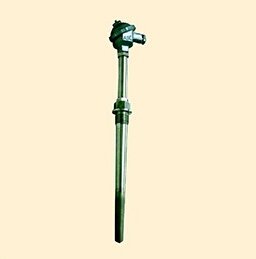
Working Principle
The wear-resistant thermocouple operates on the same fundamental principle as conventional thermocouples:
When two dissimilar metals are joined together at one end and subjected to heat, they produce a voltage (Seebeck effect) that correlates with temperature.
However, unlike standard thermocouples, wear-resistant types are specially engineered with protective materials to withstand abrasion, impact, and erosion, ensuring reliable temperature measurement in extreme conditions where material degradation is a concern.
Construction & Materials
To endure harsh operating environments, wear-resistant thermocouples use reinforced protective sheaths and rugged construction. Typical materials include:
- Tungsten Carbide – Extremely hard, ideal for resisting high-speed particle impact.
- Inconel 600 / 601 – Excellent corrosion and oxidation resistance at high temperatures.
- Silicon Nitride / Alumina Ceramics – Exceptional thermal stability and abrasion resistance.
- Hard-faced Alloys (e.g., Stellite-coated steel) – Provide surface hardness to prevent wear.
- Armored Cable Protection – Additional layer to resist mechanical damage.
The internal thermocouple element can be Type K, J, N, or E, depending on temperature range and accuracy requirements.
Applications
Wear-resistant thermocouples are widely used in industries where abrasive media, high flow velocity, or particulate materials are present, such as:
- Cement Plants – Temperature monitoring in preheaters, kilns, and clinker coolers.
- Steel & Metallurgy – Used in sintering furnaces, rolling mills, and continuous casting.
- Power Plants – Installed in pulverized coal pipes, ash hoppers, or fluidized beds.
- Mining & Mineral Processing – For ore-drying kilns or slurry systems.
- Chemical & Petrochemical – Environments involving erosive gases or solids.
Product Features
- High Wear Resistance – Maintains integrity and accuracy under abrasive flow.
- Long Operational Life – Reduces the need for frequent replacements.
- Fast Response Time – Despite its protective construction, still ensures quick temperature readings.
- Customizable Design – Can be tailored in length, diameter, sheath material, and installation method (flange, threaded, or bayonet type).
Technical Specifications (Typical)
| Parameter | Description |
|---|---|
| Temperature Range | -200°C to 1300°C (depending on type) |
| Element Types | Type K, J, N, E |
| Sheath Diameter | Φ6mm ~ Φ20mm |
| Protection Grade | IP65 / IP68 (optional) |
| Output Signal | mV (thermocouple voltage) |
| Response Time | ≤ 8 seconds (depending on structure) |
| Pressure Resistance | Up to 3MPa (if sealed construction) |
Summary
The wear-resistant thermocouple is an ideal temperature sensing solution for challenging industrial environments involving abrasive, corrosive, or high-temperature conditions. Its durability, customizability, and measurement stability make it a preferred choice for long-term, low-maintenance temperature monitoring.
